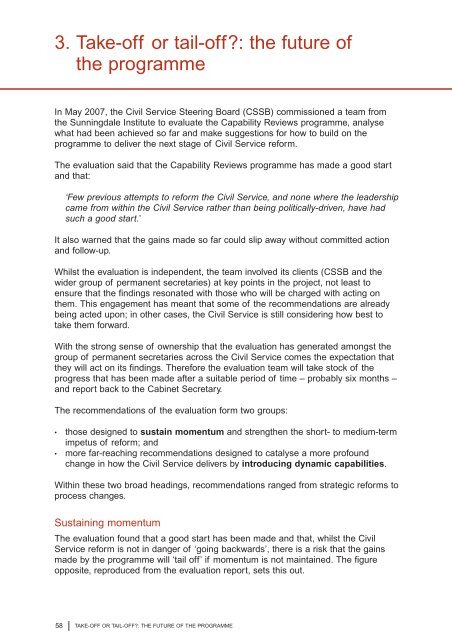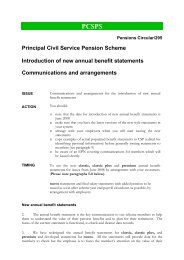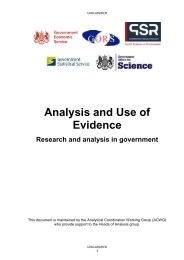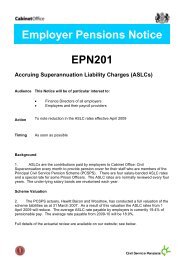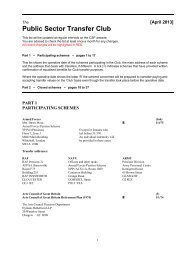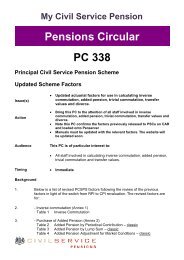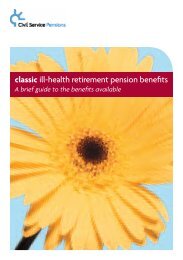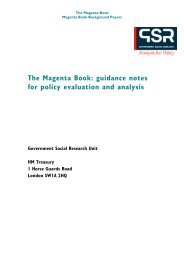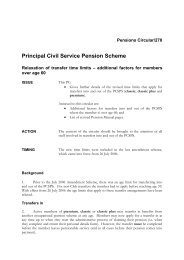Capability Reviews: Progress and Next Steps - The Civil Service
Capability Reviews: Progress and Next Steps - The Civil Service
Capability Reviews: Progress and Next Steps - The Civil Service
- No tags were found...
You also want an ePaper? Increase the reach of your titles
YUMPU automatically turns print PDFs into web optimized ePapers that Google loves.
3. Take-off or tail-off?: the future ofthe programmeIn May 2007, the <strong>Civil</strong> <strong>Service</strong> Steering Board (CSSB) commissioned a team fromthe Sunningdale Institute to evaluate the <strong>Capability</strong> <strong>Reviews</strong> programme, analysewhat had been achieved so far <strong>and</strong> make suggestions for how to build on theprogramme to deliver the next stage of <strong>Civil</strong> <strong>Service</strong> reform.<strong>The</strong> evaluation said that the <strong>Capability</strong> <strong>Reviews</strong> programme has made a good start<strong>and</strong> that:‘Few previous attempts to reform the <strong>Civil</strong> <strong>Service</strong>, <strong>and</strong> none where the leadershipcame from within the <strong>Civil</strong> <strong>Service</strong> rather than being politically-driven, have hadsuch a good start.’It also warned that the gains made so far could slip away without committed action<strong>and</strong> follow-up.Whilst the evaluation is independent, the team involved its clients (CSSB <strong>and</strong> thewider group of permanent secretaries) at key points in the project, not least toensure that the findings resonated with those who will be charged with acting onthem. This engagement has meant that some of the recommendations are alreadybeing acted upon; in other cases, the <strong>Civil</strong> <strong>Service</strong> is still considering how best totake them forward.With the strong sense of ownership that the evaluation has generated amongst thegroup of permanent secretaries across the <strong>Civil</strong> <strong>Service</strong> comes the expectation thatthey will act on its findings. <strong>The</strong>refore the evaluation team will take stock of theprogress that has been made after a suitable period of time – probably six months –<strong>and</strong> report back to the Cabinet Secretary.<strong>The</strong> recommendations of the evaluation form two groups:• those designed to sustain momentum <strong>and</strong> strengthen the short- to medium-termimpetus of reform; <strong>and</strong>• more far-reaching recommendations designed to catalyse a more profoundchange in how the <strong>Civil</strong> <strong>Service</strong> delivers by introducing dynamic capabilities.Within these two broad headings, recommendations ranged from strategic reforms toprocess changes.Sustaining momentum<strong>The</strong> evaluation found that a good start has been made <strong>and</strong> that, whilst the <strong>Civil</strong><strong>Service</strong> reform is not in danger of ‘going backwards’, there is a risk that the gainsmade by the programme will ‘tail off’ if momentum is not maintained. <strong>The</strong> figureopposite, reproduced from the evaluation report, sets this out.58 TAKE-OFF OR TAIL-OFF?: THE FUTURE OF THE PROGRAMME


